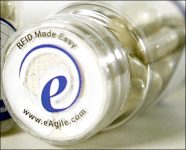
Pharmaceutical companies use eAgile’s RFID solution to track products
[ad_1]
RFID technology company is launching a solution called eSeal, which can automatically track the process of medicine from production to over-the-counter sales in pharmacies or use in hospitals. eSeal is an ultra-high frequency that can be attached to the drug bottleRFIDBottle caps, so that the entire supply chain of drugs can be tracked on the eAgile software.
EAgile is headquartered in Michigan and provides a variety of RFID solutions. In recent years, the company has begun to explore new markets and target the pharmaceutical and healthcare industries. The company’s CEO Gary Burns said: “We are studying how RFID technology can create more value and services for society.” Burns said that the disease and death caused by medical accidents are increasing at a rate of 400,000 times a year, many of which are caused by taking mistakes. Caused by improper medication or improper metering. In addition, the market is flooded with counterfeit medicines, which can also affect the health of patients.

(eSeal bottle cap has a built-in passive RFID inlay)
In the third quarter of 2015, eAgile conducted a beta test of eSeal, related hardware and management software. Burns said the company’s long-term goal is to use the system to track drugs from the factory to the consumer. The system has been tested in the production facility of a company that did not want to be named. The health product company has completed beta testing and ordered millions of bottle caps. In the future, the company will use this system in distribution centers.
The ESeal solution integrates a uniquely coded RFID inlay in the bottle closure and closure stopper, while eAgile provides a closure and closure stopper compatible with the existing production equipment of the pharmaceutical factory.
Currently, an Impinj passive UHF RFID chip is built into the eSeal bottle cap. The chip and the inlay are located between the cap and the closure plug. The chip stores a unique identifier, which is bound to the product name, strength, serial number, batch number, production date and manufacturing location. There is a version of eSeal bottle cap that automatically disables the chip when the sealing ring is opened, so that counterfeit products can be placed.
After the eSeal bottle cap is filled with the bottle filled with medicine, the readers of multiple models installed by eAgile can read the label. In this way, the system can confirm the product serial number and related information and transmit it to the customer’s own management software.
During the Beta test, the eSeal bottle cap was read in this way: it was read during boxing and shrink film packaging, and then a record of the information and time of the transported goods was created. If the tag ID and the ordered product ID do not match, the software will issue a warning before the goods are delivered to the customer.
The RFID tags attached to the pallet and the outer box are also bound to the eSeal tag ID. In this way, the software can track what should be contained in the pallet or outer box to find potential anomalies.
Pharmaceutical companies can also share these data with consumers and distributors. If RFID readers are installed in warehouses, pharmacies or hospitals, medicines can be tracked in a complete chain. If the RFID tag of the bottle cap is not read, the software will find the problem, and then the employee can know whether the bottle is missing, there is a fake bottle, and the bottle cap is opened or damaged.
In pharmacies or hospitals, the RFID tags are read again before the medicines are distributed to the patients. This will ensure that no errors have occurred.
Burns said that in the third quarter of this year, eAgile will launch eSeal bottle caps with built-in EM Microelectronic chips that support UHF and high frequency bands and are compatible with ISO 14443 Type A and EPC Gen2v2 (ISO 18000-63) standards. The company will also provide an eSeal bottle cap with a built-in version of the NXP HF RFID chip compatible with the ISO 15693 standard.
Burns said that high-frequency RFID technology allows consumers to use NFC-enabled smart phones to understand drug information. All this does not require the help of the application. Consumers only need to swipe the bottle cap with their mobile phone, and the NFC reader of the mobile phone can read the tag ID and then jump to the website, where consumers can check whether the product is genuine.
Currently, some companies have launched apps for patients to ensure that they take their medications on time. With eSeal caps with NFC function, caregivers, health care providers or family members can automatically obtain this information.
[ad_2]



